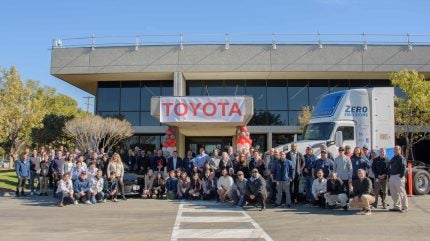
Toyota Motor North America (TMNA) said it was renaming the TMNA R&D California office as its new North American Hydrogen Headquarters (H2HQ).
The office space was recently redesigned for teams working from research and development to commercialisation planning and sales of hydrogen related products and technology.

Discover B2B Marketing That Performs
Combine business intelligence and editorial excellence to reach engaged professionals across 36 leading media platforms.
There are plans to add key features to the H2HQ campus in the future such as a flexible microgrid and sustainable customer education centre.
“Toyota has developed hydrogen fuel cell electric solutions for more than three decades, and we will continue to advance this scalable, zero emission technology as part of our electrified portfolio,” said Ted Ogawa, president and CEO, Toyota Motor North America.
Last year, Toyota Motor Corporation reorganised its hydrogen business in Japan to create what it calls Hydrogen Factory with the idea to bring all hydrogen-related work under one location and accelerate customer oriented product development and production in fuel cell or hydrogen related products.
Then, Toyota Motor Europe announced its own Hydrogen Factory with the aim to further grow Toyota’s H2 business and stimulate wider roll out of hydrogen ecosystems and infrastructure across Europe.
H2HQ will drive North American led hydrogen initiatives and support the localisation of global hydrogen related technology and products which include light duty fuel cell applications, heavy duty fuel cell opportunities, stationary fuel cell power generation, port vehicle applications and more.
The facility already houses impressive R&D assets, including Toyota’s largest dynamometer (1.2 MW), a scalable test bench for stationary applications and a hydrogen fueling station capable of providing fuel for both light and heavy duty vehicles.
Construction has begun on a flexible microgrid that features energy sources available today, including a 230kW solar photovoltaic system, a 1MW stationary proton exchange membrane (PEM) fuel cell generator, 325kW solid oxide fuel cell (SOFC) and a 500kWh battery energy storage system. The microgrid is designed to support the campus’ energy needs, allowing it to operate off grid. The system is expected to be fully operational by 2026.
Toyota also plans a sustainable education centre, available for tours by reservation.






